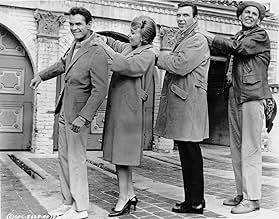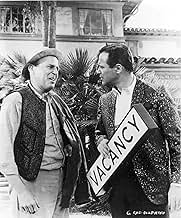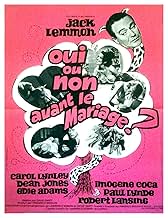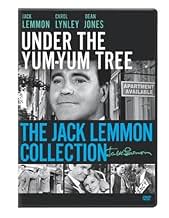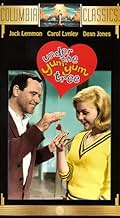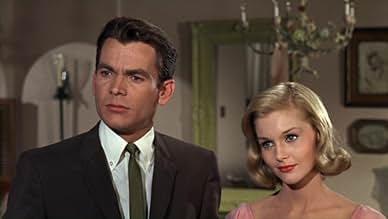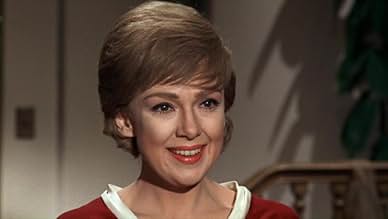AVALIAÇÃO DA IMDb
6,0/10
2,2 mil
SUA AVALIAÇÃO
Adicionar um enredo no seu idiomaA horny, love-struck landlord tries to convince a pretty young tenant to dump her fiancé and give him a chance.A horny, love-struck landlord tries to convince a pretty young tenant to dump her fiancé and give him a chance.A horny, love-struck landlord tries to convince a pretty young tenant to dump her fiancé and give him a chance.
- Prêmios
- 2 indicações no total
Jerry Antes
- Adam
- (não creditado)
Tom Anthony
- Barber
- (não creditado)
Army Archerd
- Writer
- (não creditado)
Phil Arnold
- Delivery Man
- (não creditado)
Roger Bacon
- Writer
- (não creditado)
Bill Bixby
- Track Team Coach
- (não creditado)
Paul Bradley
- Barbershop Customer
- (não creditado)
Françoise Bush
- College Girl
- (não creditado)
Gloria Calomee
- Sandy
- (não creditado)
Cliff Carnell
- Athletic Instructor
- (não creditado)
Avaliações em destaque
I've been catching up on a few of these early sixties semi-sex comedies, while in Covid essential isolation. I'm starting to fall in love with Carol Lynley though sadly, she died about a year ago. Jack Lemmon is always funny and interesting, Edie Adams is forever appealing and Paul Lynde, as the frustrated repressed wannabe letch is amusing to watch.
Yes, I was entertained throughout, yes it was relatively original and yes, I recommend it. However, it does go on for a bit too long without veering direction and there's never a moment when you don't know where it's going to end up. It was, after all, 1963, when the Hays code was starting to be lifted but wasn't quite there yet. Young people in the country were preparing for the sexual revolution but they weren't quite there yet, either. By 1967, the year of Bonnie and Clyde, The Graduate and the year after Who's Afraid of Virginia Woolf, the dynamic between this couple would have been entirely different. And by 1974, the film could have gone in a wide assortment of directions. In 1963, again at the time of the almost sex comedy, there was really only one way this film could go. Watching it get there was entertaining but again, it needed a few more turns and twists to justify the length.
Norman Fell's landlord character from The Graduate ended up as the landlord on Three's Company. It might have been interesting to see this landlord replace him.
Yes, I was entertained throughout, yes it was relatively original and yes, I recommend it. However, it does go on for a bit too long without veering direction and there's never a moment when you don't know where it's going to end up. It was, after all, 1963, when the Hays code was starting to be lifted but wasn't quite there yet. Young people in the country were preparing for the sexual revolution but they weren't quite there yet, either. By 1967, the year of Bonnie and Clyde, The Graduate and the year after Who's Afraid of Virginia Woolf, the dynamic between this couple would have been entirely different. And by 1974, the film could have gone in a wide assortment of directions. In 1963, again at the time of the almost sex comedy, there was really only one way this film could go. Watching it get there was entertaining but again, it needed a few more turns and twists to justify the length.
Norman Fell's landlord character from The Graduate ended up as the landlord on Three's Company. It might have been interesting to see this landlord replace him.
I'm sure that the reason Jack Lemmon was cast in the screen version of Under the Yum Yum Tree was the resemblance of his character of the landlord Hogan here with the part that got him his first Oscar, Ensign Frank Pulver in Mister Roberts. Superficially there is a resemblance.
But the womanizing frat boy gone to sea in Mister Roberts is behaving under acceptable standards. It's kind of expected that men act out their sexual fantasies being deprived of it when on sea duty. Those stories about sailors on shore leave aren't an exaggeration.
In Under the Yum Yum Tree it's as though Frank Pulver was left an inheritance of an apartment building which is obviously strategically located near a co-ed campus. What was acceptable behavior for Lemmon in Mister Roberts is unbelievable in this situation.
Try as he might Lemmon cannot make this character likable. He's a rich guy who never worked a day in his life which apparently is devoted to being a peeping tom in regard to all the beautiful young women he rents to. And he only rents to young women.
When you think about it, it's pretty darn scary. I can't believe one of these girls hasn't called the police on him.
On Broadway the play was a five character thing and only Dean Jones came over from Broadway. Lemmon, Carol Lynley's part, and Edie Adams part were taken by Gig Young, Sandra Church, and Nan Martin. Under the Yum Yum Tree had a respectable run of 173 performances on Broadway.
But if this is what the theater audience saw, how did it run so long?
But the womanizing frat boy gone to sea in Mister Roberts is behaving under acceptable standards. It's kind of expected that men act out their sexual fantasies being deprived of it when on sea duty. Those stories about sailors on shore leave aren't an exaggeration.
In Under the Yum Yum Tree it's as though Frank Pulver was left an inheritance of an apartment building which is obviously strategically located near a co-ed campus. What was acceptable behavior for Lemmon in Mister Roberts is unbelievable in this situation.
Try as he might Lemmon cannot make this character likable. He's a rich guy who never worked a day in his life which apparently is devoted to being a peeping tom in regard to all the beautiful young women he rents to. And he only rents to young women.
When you think about it, it's pretty darn scary. I can't believe one of these girls hasn't called the police on him.
On Broadway the play was a five character thing and only Dean Jones came over from Broadway. Lemmon, Carol Lynley's part, and Edie Adams part were taken by Gig Young, Sandra Church, and Nan Martin. Under the Yum Yum Tree had a respectable run of 173 performances on Broadway.
But if this is what the theater audience saw, how did it run so long?
A skirt chaser manages an apartment complex in which all the residents are beautiful women. He regularly wines and dines the ladies, and is a charming, although rascally fellow. He brings in a new tenant and begins his game on her, much to the annoyance of her boyfriend. Most of the film is spent with the landlord trying to get into the new tenant's pants, and her boyfriend making every effort to keep him out. Fairly funny spoof on the California lifestyle.
There are so many competent recaps, I will spare readers of my own. However, suffice it to say that this is a pretty simple movie.
The poor reviews were really fascinating to see before I watched the movie, so naturally, I felt even more intrigued. I will admit that this is not Oscar-worthy material in any way. It's a fluffy movie that had earnest attempts at humor and levity. It isn't going to make anyone see life differently, *unless*: you are able to open your mind a little.
The underlying message of the movie is initially "it's wrong to live together romantically unless you're married" (typical mid-century mindset). The secondary theme is "misunderstanding". The love interest is misled both intentionally and unintentionally, which results in the eventual winning of her heart.
But, the final message that I took from this movie is the one that was eloquently stated by Aunt Irene, who states that "love is created", and doesn't fall off a tree. Even when it seems that way, your relationship is not going to be butterflies and flowers forever, no matter how in-love you begin. It's about truly caring for the other, and trying to offer them grace and understanding.
This was at the very end of the movie, and it inspired me to actually like the movie enough to save it on my DVR!
The biggest downfalls of this movie, aside from the many you've read already, are the fact that it's boring when there is a lack of dialogue and only Jack Lemmon making goofy faces; the portions with the meddling groundskeeper and his wife were also like watching a sitcom, nothing special or unique. The most interesting non-plot feature to me was the incredible set, full of both real and fake objects. It was just so colorful, starting with the opening theme song.
The most impressive moment of all: when the celebrity kitty (Orangey) was holding himself up with front paws on a brick wall, while drinking a saucer of milk. Incredibly adorable and worth seeing!
The poor reviews were really fascinating to see before I watched the movie, so naturally, I felt even more intrigued. I will admit that this is not Oscar-worthy material in any way. It's a fluffy movie that had earnest attempts at humor and levity. It isn't going to make anyone see life differently, *unless*: you are able to open your mind a little.
The underlying message of the movie is initially "it's wrong to live together romantically unless you're married" (typical mid-century mindset). The secondary theme is "misunderstanding". The love interest is misled both intentionally and unintentionally, which results in the eventual winning of her heart.
But, the final message that I took from this movie is the one that was eloquently stated by Aunt Irene, who states that "love is created", and doesn't fall off a tree. Even when it seems that way, your relationship is not going to be butterflies and flowers forever, no matter how in-love you begin. It's about truly caring for the other, and trying to offer them grace and understanding.
This was at the very end of the movie, and it inspired me to actually like the movie enough to save it on my DVR!
The biggest downfalls of this movie, aside from the many you've read already, are the fact that it's boring when there is a lack of dialogue and only Jack Lemmon making goofy faces; the portions with the meddling groundskeeper and his wife were also like watching a sitcom, nothing special or unique. The most interesting non-plot feature to me was the incredible set, full of both real and fake objects. It was just so colorful, starting with the opening theme song.
The most impressive moment of all: when the celebrity kitty (Orangey) was holding himself up with front paws on a brick wall, while drinking a saucer of milk. Incredibly adorable and worth seeing!
A sleezy landlord (Jack Lemon) who only rents to pretty young and single women accidently rents to a couple who a trying some modern relationship plan....for the early 60s. They plan to get married after college and hope to avoid getting a divorce in the future. Thus. They decide to live together, without any physical intimacy, to see if they are compatible with everyday life stuff. Jack Lemon is lurking around their personal life. Will he try to sneak the woman away from the boyfriend or give him advice about trying to survive this new arrangement without succumbing to hanky panky. All the topics are dripping with humor and some physical comedy. Good for a few corny laughs.
Você sabia?
- CuriosidadesTo help out his friend Edie Adams financially after her husband Ernie Kovacs's sudden death left her debt-ridden, star/co-producer Jack Lemmon not only insisted upon hiring her for this film, but further insisted that her part be expanded considerably from the original stage play to give her more work.
- Erros de gravaçãoRobin comes up to the door of her apartment with a bag of groceries, which includes two upside-down bunches of celery (root end up), and a square-shaped box of eggs. Then as the camera angle switches to show her coming through the door, the two bunches of celery have suddenly switched to right side up (leafy end up), and the square box of eggs has magically turned into a rectangular shaped box.
- ConexõesFeatured in Hollywood and the Stars: The Funny Men: Part 2 (1963)
Principais escolhas
Faça login para avaliar e ver a lista de recomendações personalizadas
Detalhes
- Data de lançamento
- País de origem
- Idiomas
- Também conhecido como
- El pícaro seductor
- Locações de filme
- 1355 N. Laurel Ave., West Hollywood, Califórnia, EUA(Centaur Apartments)
- Empresa de produção
- Consulte mais créditos da empresa na IMDbPro
- Tempo de duração1 hora 50 minutos
- Proporção
- 1.85 : 1
Contribua para esta página
Sugerir uma alteração ou adicionar conteúdo ausente

Principal brecha
By what name was Don Juan Era Aprendiz (1963) officially released in India in English?
Responda

